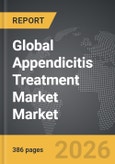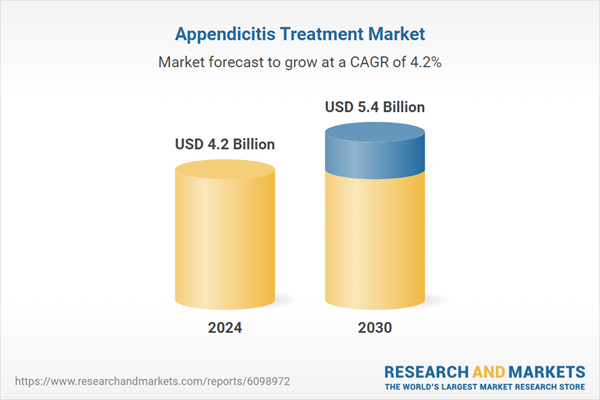Global Appendicitis Treatment Market - Key Trends & Drivers Summarized
Why Is Appendicitis Treatment Evolving Beyond Surgical Norms in Modern Clinical Practice?
Appendicitis treatment is undergoing a clinical transformation as healthcare systems reconsider the traditional surgical-first approach in favor of more tailored, patient-specific strategies. Acute appendicitis, one of the most common abdominal emergencies globally, has historically been managed through appendectomy - either open or laparoscopic - as the definitive treatment. However, growing evidence from clinical trials and real-world studies now supports non-operative management with antibiotics for select cases of uncomplicated appendicitis. This paradigm shift is motivated by the potential to reduce surgical risk, minimize hospital stays, and improve patient recovery timelines, particularly in resource-constrained settings or during healthcare system disruptions such as the COVID-19 pandemic.While appendectomy remains the gold standard for complicated, perforated, or recurrent cases, non-surgical treatment is gaining ground among pediatric and adult patients with early-stage or localized inflammation. Antibiotic-only protocols are proving effective in up to 70-80% of such cases, with a low short-term recurrence rate. Additionally, shared decision-making models - where patients are actively involved in treatment planning - are leading to more conservative management choices, supported by diagnostic imaging, symptom monitoring, and follow-up protocols. This clinical diversification is creating a dual-pathway treatment framework that optimizes outcomes based on case severity, patient comorbidities, and system-level considerations.
How Are Surgical Advancements and Minimally Invasive Techniques Improving Outcomes?
For cases requiring operative intervention, advancements in minimally invasive surgery (MIS) are significantly enhancing treatment outcomes and patient recovery in appendicitis management. Laparoscopic appendectomy has become the preferred technique in high-income and urban healthcare settings due to its reduced postoperative pain, lower wound infection rates, shorter hospital stays, and faster return to daily activities compared to traditional open surgery. Surgeons are increasingly adopting single-incision laparoscopic surgery (SILS) and robotic-assisted appendectomy in select centers, offering further cosmetic and ergonomic advantages, although cost and training requirements currently limit widespread adoption.Enhanced recovery protocols, better anesthetic management, and intraoperative imaging are streamlining surgical workflows and minimizing complications. Moreover, the integration of intraoperative scoring systems (e.g., Alvarado, AIR score) and preoperative imaging (CT, MRI, or ultrasound) is aiding in the rapid stratification of cases and optimizing surgical timing. In resource-limited or rural settings, mobile surgical units and simplified MIS kits are being deployed to improve access. These surgical innovations are reinforcing the role of appendectomy in managing complex appendicitis, while aligning with health systems' goals for shorter hospitalizations, reduced readmissions, and cost efficiency. As surgical capabilities continue to evolve, they are contributing to a more dynamic, patient-centered appendicitis treatment landscape.
Where Is Market Demand Growing and Which Patient Segments Are Driving Treatment Volume?
Global demand for appendicitis treatment remains high due to the consistent incidence of acute appendicitis across all age groups, with particular prevalence in individuals aged 10-30. North America and Europe lead in surgical volume and treatment innovation, with high rates of laparoscopic appendectomies, early diagnostics, and uptake of outpatient protocols. In these regions, elective and semi-elective appendectomies are increasingly being performed in ambulatory settings, reducing healthcare resource utilization. Pediatric and adolescent patients represent a key volume segment, as appendicitis is a leading cause of emergency abdominal surgery in children and teenagers.Asia-Pacific and Latin America are seeing rapid increases in both diagnosis and treatment access due to improving healthcare infrastructure, rising urbanization, and growing awareness. India, China, and Brazil are emerging as high-demand markets with expanding laparoscopic capacity and wider antibiotic access. In low-resource countries, the focus remains on scaling basic diagnostic tools and safe surgical services to reduce complications and mortality from untreated or delayed appendicitis. Women of reproductive age are another important subgroup, as differential diagnosis with gynecological conditions necessitates high imaging precision and cross-disciplinary care. This expanding and diverse patient base underscores the importance of adaptable treatment protocols and equitable access to both surgical and non-surgical modalities across global markets.
What Is Driving the Global Growth of the Appendicitis Treatment Market?
The growth in the appendicitis treatment market is driven by several factors, including increased diagnostic accuracy, growing acceptance of non-operative approaches, and improvements in surgical technology. A core growth driver is the high and relatively stable incidence of appendicitis globally, which continues to ensure consistent demand for both emergency and elective interventions. Advances in imaging - particularly point-of-care ultrasound and low-dose CT - are enabling faster, more accurate diagnosis, reducing negative appendectomy rates and guiding evidence-based treatment decisions. The rise of antibiotic stewardship programs and outpatient management models is expanding the role of medical therapy, especially in uncomplicated cases.Healthcare system modernization, including the expansion of ambulatory surgical centers and day-care procedures, is making appendectomy more accessible and cost-effective. Innovation in anesthesia, perioperative care, and MIS equipment is further driving adoption across all tiers of care. Additionally, payer systems and hospital networks are aligning reimbursement strategies with minimally invasive, cost-efficient appendicitis pathways. Global health initiatives are also improving access to emergency surgery and antibiotics in underserved regions. As treatment paradigms continue to evolve toward greater flexibility and patient involvement, the question ahead becomes: Can healthcare systems globally integrate surgical excellence with medical management to create a universally accessible, outcomes-driven model for appendicitis care?
Report Scope
The report analyzes the Appendicitis Treatment market, presented in terms of market value (US$). The analysis covers the key segments and geographic regions outlined below:- Segments: Type (Acute Appendicitis, Chronic Appendicitis); Treatment (Surgery, Laparoscopic Surgery, Open Laparotomy, Medication, Other Treatments); End-Use (Hospitals, Ambulatory Surgery Centers, Specialty Clinics, Other End-Uses).
- Geographic Regions/Countries: World; United States; Canada; Japan; China; Europe (France; Germany; Italy; United Kingdom; Spain; Russia; and Rest of Europe); Asia-Pacific (Australia; India; South Korea; and Rest of Asia-Pacific); Latin America (Argentina; Brazil; Mexico; and Rest of Latin America); Middle East (Iran; Israel; Saudi Arabia; United Arab Emirates; and Rest of Middle East); and Africa.
Some of the 47 companies featured in this Appendicitis Treatment market report include -
- Abbott Laboratories
- AbbVie Inc.
- AstraZeneca plc
- B. Braun Melsungen AG
- Baxter International Inc.
- Becton, Dickinson and Company
- Boston Scientific Corporation
- Cipla Limited
- Cook Medical
- F. Hoffmann-La Roche Ltd.
- GlaxoSmithKline plc (GSK)
- Integra LifeSciences Holdings Corp.
- Johnson & Johnson
- Koninklijke Philips N.V.
- Lupin Limited
- McNeil Pharmaceuticals
- Medtronic plc
- Merck & Co., Inc.
- Novartis AG
- Olympus Corporation
Key Insights:
- Market Growth: Understand the significant growth trajectory of the Acute Appendicitis segment, which is expected to reach US$3.4 Billion by 2030 with a CAGR of a 3.4%. The Chronic Appendicitis segment is also set to grow at 5.7% CAGR over the analysis period.
- Regional Analysis: Gain insights into the U.S. market, valued at $1.1 Billion in 2024, and China, forecasted to grow at an impressive 7.5% CAGR to reach $1.1 Billion by 2030. Discover growth trends in other key regions, including Japan, Canada, Germany, and the Asia-Pacific.
Why You Should Buy This Report:
- Detailed Market Analysis: Access a thorough analysis of the Global Appendicitis Treatment Market, covering all major geographic regions and market segments.
- Competitive Insights: Get an overview of the competitive landscape, including the market presence of major players across different geographies.
- Future Trends and Drivers: Understand the key trends and drivers shaping the future of the Global Appendicitis Treatment Market.
- Actionable Insights: Benefit from actionable insights that can help you identify new revenue opportunities and make strategic business decisions.
Key Questions Answered:
- How is the Global Appendicitis Treatment Market expected to evolve by 2030?
- What are the main drivers and restraints affecting the market?
- Which market segments will grow the most over the forecast period?
- How will market shares for different regions and segments change by 2030?
- Who are the leading players in the market, and what are their prospects?
Report Features:
- Comprehensive Market Data: Independent analysis of annual sales and market forecasts in US$ Million from 2024 to 2030.
- In-Depth Regional Analysis: Detailed insights into key markets, including the U.S., China, Japan, Canada, Europe, Asia-Pacific, Latin America, Middle East, and Africa.
- Complimentary Updates: Receive free report updates for one year to keep you informed of the latest market developments.
Select Competitors (Total 47 Featured):
- Abbott Laboratories
- AbbVie Inc.
- AstraZeneca plc
- B. Braun Melsungen AG
- Baxter International Inc.
- Becton, Dickinson and Company
- Boston Scientific Corporation
- Cipla Limited
- Cook Medical
- F. Hoffmann-La Roche Ltd.
- GlaxoSmithKline plc (GSK)
- Integra LifeSciences Holdings Corp.
- Johnson & Johnson
- Koninklijke Philips N.V.
- Lupin Limited
- McNeil Pharmaceuticals
- Medtronic plc
- Merck & Co., Inc.
- Novartis AG
- Olympus Corporation
This edition integrates the latest global trade and economic shifts into comprehensive market analysis. Key updates include:
- Tariff and Trade Impact: Insights into global tariff negotiations across 180+ countries, with analysis of supply chain turbulence, sourcing disruptions, and geographic realignment. Special focus on 2025 as a pivotal year for trade tensions, including updated perspectives on the Trump-era tariffs.
- Adjusted Forecasts and Analytics: Revised global and regional market forecasts through 2030, incorporating tariff effects, economic uncertainty, and structural changes in globalization. Includes historical analysis from 2015 to 2023.
- Strategic Market Dynamics: Evaluation of revised market prospects, regional outlooks, and key economic indicators such as population and urbanization trends.
- Innovation & Technology Trends: Latest developments in product and process innovation, emerging technologies, and key industry drivers shaping the competitive landscape.
- Competitive Intelligence: Updated global market share estimates for 2025, competitive positioning of major players (Strong/Active/Niche/Trivial), and refined focus on leading global brands and core players.
- Expert Insight & Commentary: Strategic analysis from economists, trade experts, and domain specialists to contextualize market shifts and identify emerging opportunities.
Table of Contents
Companies Mentioned (Partial List)
A selection of companies mentioned in this report includes, but is not limited to:
- Abbott Laboratories
- AbbVie Inc.
- AstraZeneca plc
- B. Braun Melsungen AG
- Baxter International Inc.
- Becton, Dickinson and Company
- Boston Scientific Corporation
- Cipla Limited
- Cook Medical
- F. Hoffmann-La Roche Ltd.
- GlaxoSmithKline plc (GSK)
- Integra LifeSciences Holdings Corp.
- Johnson & Johnson
- Koninklijke Philips N.V.
- Lupin Limited
- McNeil Pharmaceuticals
- Medtronic plc
- Merck & Co., Inc.
- Novartis AG
- Olympus Corporation
Table Information
| Report Attribute | Details |
|---|---|
| No. of Pages | 386 |
| Published | February 2026 |
| Forecast Period | 2024 - 2030 |
| Estimated Market Value ( USD | $ 4.2 Billion |
| Forecasted Market Value ( USD | $ 5.4 Billion |
| Compound Annual Growth Rate | 4.2% |
| Regions Covered | Global |









